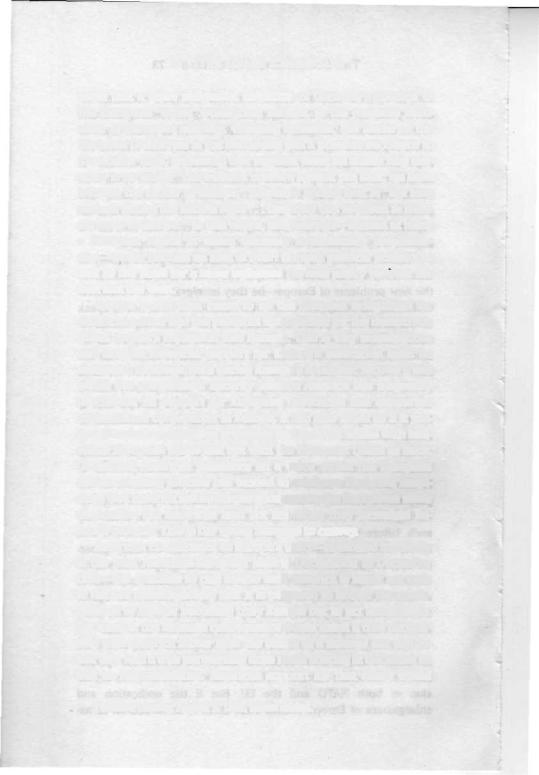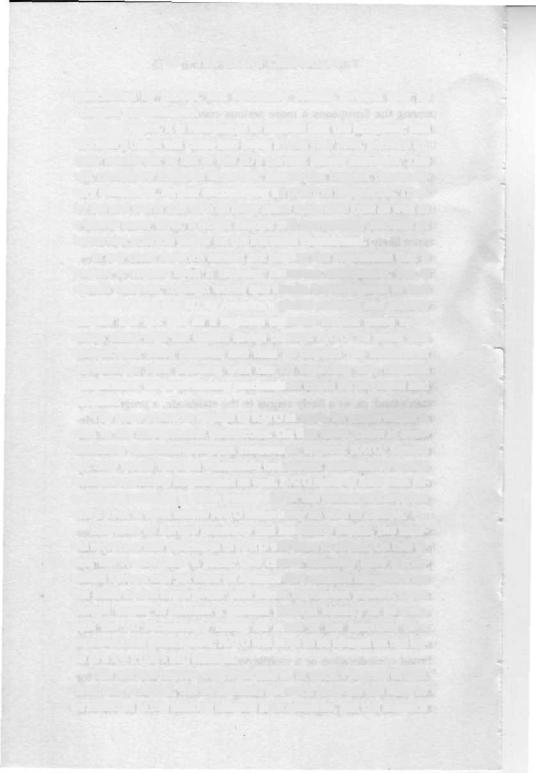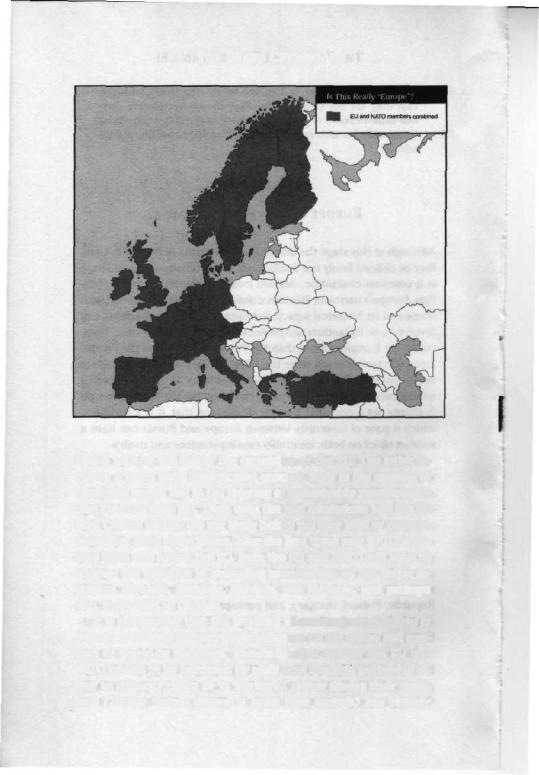
Grand_Chessboard
.pdf
THE DEMOCRATIC BRIDGEHEAD 73
sorbed by their internal social concerns. Europe's economic recovery has obscured the longer-run costs of its seeming success. These costs are damaging economically as well as politically. The crisis of political legitimacy and economic vitality that Western Europe increasingly confronts—but is unable to overcome—is deeply rooted in the pervasive expansion of the state-sponsored social structure that favors paternalism, protectionism, and parochialism. The result is a cultural condition that combines escapist hedonism with spiritual emptiness—a condition that can be exploited by nationalist extremists or dogmatic ideologues.
This condition, if it becomes rampant, could prove deadly to democracy and the idea of Europe. The two, in fact, are linked, for the new problems of Europe—be they immigration or economictechnological competitiveness with America or Asia, not to speak of the need for a politically stable reform of existing socioeconomic structures—can only be dealt with effectively in an increasingly continental context. A Europe that is larger than the sum of its parts—that is, a Europe that sees a global role for itself in the promotion of democracy and in the wider proselytization of basic human values—is more likely to be a Europe that is firmly uncongenial to political extremism, narrow nationalism, or social hedonism.
One need neither evoke the old fears of a separate GermanRussian accommodation nor exaggerate the consequences of French tactical flirtation with Moscow to entertain concern for the geopolitical stability of Europe—and for America's place in it—re- sulting from a failure of Europe's still ongoing efforts to unite. Any such failure would in fact probably entail some renewed and rather traditional European maneuvers. It would certainly generate opportunities for either Russian or German geopolitical self-as- sertion, though if Europe's modern history contains any lesson, neither would be likely to gain an enduring success in that regard. However, at the very least, Germany would probably become more assertive and explicit in the definition of its national interests.
Currently, Germany's interests are congruent with, and even sublimated within, those of the EU and of NATO. Even the spokesmen for the leftist Alliance 90/Greens have advocated the expansion of both NATO and the EU. But if the unification and enlargement of Europe should stall, there is some reason to as-

74 THE GRAND CHESSBOARD
sume that a more nationalist definition of Germany's concept of the European "order" would then surface, to the potential detriment of European stability. Wolfgang Schauble, the leader of the Christian Democrats in the Bundestag and a possible successor to Chancellor Kohl, expressed that mindset when he stated that Germany is no longer "the western bulwark against the East; we have become the center of Europe," pointedly adding that in "the long periods during the Middle Ages ... Germany was involved in creating order in Europe. "* In this vision, Mitteleuropa—instead of being a European region in which Germany economically preponder- ates—would become an area of overt German political primacy as well as the basis tor a more unilateral German policy vis-a-vis the East and the West.
Europe would then cease to be the Eurasian bridgehead for American power and the potential springboard for the democratic global system's expansion into Eurasia. This is why unambiguous and tangible American support for Europe's unification must be sustained. Although both during Europe's economic recovery and within the transatlantic security alliance America has frequently proclaimed its support for European unification and supported transnational cooperation in Europe, it has also acted as if it preferred to deal on troubling economic and political issues with individual European states and not with the European Union as such. Occasional American insistence on a voice within the European decision-making process has tended to reinforce European suspicions that America favors cooperation among the Europeans when they follow the American lead but not when they formulate Europe's policies. This is the wrong message to convey.
American commitment to Europe's unity—reiterated forcefully in the joint American-European Madrid Declaration of December 1995—will continue to ring hollow until America is ready not only to declare unambiguously that it is prepared to accept the consequences of Europe becoming truly Europe but to act accordingly. For Europe, the ultimate consequence would entail a true partnership with America rather than the status of a favored but still junior ally. And a true partnership does mean sharing in decisions as well as responsibilities. American support for that cause would
'PoiitikenSondag,August2,1996,italicsadded.

THE DEMOCRATIC BRIDGEHEAD 75
help to invigorate the transatlantic dialogue and would stimulate among the Europeans a more serious concentration on the role that a truly significant Europe might play in the world.
It is conceivable that at some point a truly united and powerful European Union could become a global political rival to the United States. It could certainly become a difficult economic-technologi- cal competitor, while its geopolitical interests in the Middle East and elsewhere could significantly diverge from those of America. But, in fact, such a powerful and politically single-minded Europe is not likely in the foreseeable future. Unlike the conditions prevailing in America at the time of the formation of the United States, there are deep historical roots to the resiliency of the European na- tion-states and the passion for a transnational Europe has clearly waned.
The real alternatives for the next decade or two are either an expanding and unifying Europe, pursuing—though hesitantly and spasmodically—the goal of continental unity; a stalemated Europe, not moving much beyond its current state of integration and geographic scope, with Central Europe remaining a geopolitical no- man's-land; or, as a likely sequel to the stalemate, a progressively fragmenting Europe, resuming its old power rivalries. In a stalemated Europe, it is almost inevitable that Germany's self-identifica- tion with Europe will wane, prompting a more nationalist definition of the German state interest. For America, the first option is clearly the best, but it is an option that requires energizing American support if it is to come to pass.
At this stage of Europe's hesitant construction, America need not get directly involved in intricate debates regarding such issues as whether the EU should make its foreign policy decisions by majority vote (a position favored especially by the Germans); whether the European Parliament should assume decisive legislative powers and the European Commission in Brussels should become in effect the European executive; whether the timetable for implementing the agreement on European economic and monetary union should be relaxed; or, finally, whether Europe should be a broad confederation or a multilayered entity, with a federated inner core and a somewhat looser outer rim. These are matters for the Europeans to thrash out among themselves—and it is more than likely that progress on all of these issues will be uneven,

76 THE GRAND CHESSBOARD
punctuated by pauses, and eventually pushed forward only by complex compromises.
Nonetheless, it is reasonable to assume that the Economic and Monetary Union will come into being by the year 2000, perhaps initially among six to ten of the EU's current fifteen members. This will accelerate Europe's economic integration beyond the monetary dimension, further encouraging its political integration. Thus, by fits and starts and with an inner more integrated core as well as a looser outer layer, a single Europe will increasingly become an important political player on the Eurasian chessboard.
In any case, America should not convey the impression that it prefers a vaguer, even if broader, European association, but it should reiterate, through words and deeds, its willingness to deal eventually with the EU as America's global political and security partner and not just as a regional common market made up of states allied with the United States through NATO. To make that commitment more credible and thus go beyond the rhetoric of partnership, joint planning with the EU regarding new bilateral transatlantic decision-making mechanisms could be proposed and initiated.
The same principle applies to NATO as such. Its preservation is vital to the transatlantic connection. On this issue, there is overwhelming American-European consensus. Without NATO, Europe not only would become vulnerable but almost immediately would become politically fragmented as well. NATO ensures European security and provides a stable framework for the pursuit of European unity. That is what makes NATO historically so vital to Europe.
However, as Europe gradually and hesitantly unifies, the internal structure and processes of NATO will have to adjust. On this issue, the French have a point. One cannot someday have a truly united Europe and yet have an alliance that remains integrated on the basis of one superpower plus fifteen dependent powers. Once Europe begins to assume a genuine political identity of its own, with the EU increasingly taking on some of the functions of a supranational government, NATO will have to be altered on the basis of a 1 + 1 (US + EU) formula.
This will not happen overnight and all at once. Progress in that direction, to repeat, will be hesitant. But such progress will have to be reflected in the existing alliance arrangements, lest the absence

THE DEMOCRATIC BRIDGEHEAD 77
of such adjustment itself should become an obstacle to further progress. A significant step in that direction was the 1996 decision of the alliance to make room for the Combined Joint Task Forces, thereby envisaging the possibility of some purely European military initiatives based on the alliance's logistics as well as on command, control, communications, and intelligence. Greater U.S. willingness to accommodate French demands for an increased role for the Western European Union within NATO, especially in regard to command and decision making, would also betoken more genuine American support for European unity and should help to narrow somewhat the gap between America and France regarding Europe's eventual self-definition.
In the longer run, it is possible that the WEU will embrace some EU member states that, for varying geopolitical or historical reasons, may choose not to seek NATO membership. That could involve Finland or Sweden, or perhaps even Austria, all of which have already acquired observer status with the WEU.5 Other states may also seek a WEU connection as a preliminary to eventual NATO membership. The WEU might also choose at some point to emulate NATO's Partnership for Peace program with regard to would-be members of the EU. All of that would help to spin a wider web of security cooperation in Europe, beyond the formal scope of the transatlantic alliance.
In the meantime, until a larger and more united Europe emerges—and that, even under the best of conditions, will not be soon—the United States will have to work closely with both France and Germany in order to help such a more united and larger Europe emerge. Thus, regarding France, the central policy dilemma for America will continue to be how to inveigle France into closer Atlantic political and military integration without compromising the American-German connection, and regarding Germany, how to
5lt is noteworthy that influential voices both in Finland and in Sweden have began to discuss the possibility of association with NATO. In May 1996, the commander of the Finnish Defense Forces was reported by the Swedish media to have raised the possibility of some NATO deployments on Nordic soil, and in August 1996, the Swedish Parliament's Defense Committee, in an action symptomatic of a gradual drift toward closer security cooperation with NATO, recommended that Sweden join the Western European Armaments Group (WEAG) to which only NATO members belong.

78 THE GRAND CHESSBOARD
exploit U.S. reliance on German leadership in an Atlanticist Europe without prompting concern in France and Britain as well as in other European countries.
More demonstrable American flexibility on the future shape of the alliance would be helpful in eventually mobilizing greater French support for the alliance's eastward expansion. In the long run, a NATO zone of integrated military security on both sides of Germany would more firmly anchor Germany within a multilateral framework, and that should be a matter of consequence for France. Moreover, the expansion of the alliance would increase the probability that the Weimar Triangle (of Germany, France, and Poland) could become a subtle means for somewhat balancing German leadership in Europe. Although Poland relies on German support for gaining entrance into the alliance (and resents current French hesitations regarding such expansion), once it is inside the alliance a shared Franco-Polish geopolitical perspective is more likely to emerge.
In any case, Washington should not lose sight of the fact that France is only a short-term adversary on matters pertaining to the identity of Europe or to the inner workings of NATO. More important, it should bear in mind the fact that France is an essential partner in the important task of permanently locking a democratic Germany into Europe. That is the historic role of the FrancoGerman relationship, and the expansion of both the EU and NATO eastward should enhance the importance of that relationship as Europe's inner core. Finally, France is not strong enough either to obstruct America on the geostrategic fundamentals of America's European policy or to become by itself a leader of Europe as such. Hence, its peculiarities and even its tantrums can be tolerated.
It is also germane to note that France does play a constructive role in North Africa and in the Francophone African countries. It is the essential partner for Morocco and Tunisia, while also exercising a stabilizing role in Algeria. There is a good domestic reason for such French involvement: some 5 million Muslims now reside in France. France thus has a vital stake in the stability and orderly development of North Africa. But that interest is of wider benefit to Europe's security. Without the French sense of mission, Europe's southern flank would be much more unstable and threatening. All of southern Europe is becoming increasingly concerned

THE DEMOCRATIC BRIDGEHEAD 79
with the social-political threat posed by instability along the Mediterranean's southern littoral. France's intense concern for what transpires across the Mediterranean is thus quite pertinent to NATO's security concerns, and that consideration should be taken into account when America occasionally has to cope with France's exaggerated claims of special leadership status.
Germany Is another matter. Germany's dominant role cannot be denied, but caution must be exercised regarding any public endorsements of the German leadership role in Europe. That leadership may be expedient to some European states—like those in Central Europe that appreciate the German initiative on behalf of Europe's eastward expansion—and it may be tolerable to the Western Europeans as long as it is subsumed under America's primacy, but in the long run, Europe's construction cannot be based on it. Too many memories still linger; too many fears are likely to surface. A Europe constructed and led by Berlin is simply not feasible. That is why Germany needs France, why Europe needs the FrancoGerman connection, and why America cannot choose between Germany and France.
The essential point regarding NATO expansion is that it is a process integrally connected with Europe's own expansion. If the European Union is to become a geographically larger commu- nity—with a more-integrated Franco-German leading core and lessintegrated outer layers—and if such a Europe is to base its security on a continued alliance with America, then it follows that its geopolitically most exposed sector, Central Europe, cannot be demonstratively excluded from partaking in the sense of security that the rest of Europe enjoys through the transatlantic alliance. On this, America and Germany agree. For them, the impulse for enlargement is political, historical, and constructive. It is not driven by animosity toward Russia, nor by fear of Russia, nor by the desire to isolate Russia.
Hence, America must work particularly closely with Germany in promoting the eastward expansion of Europe. American-German cooperation and joint leadership regarding this issue are essential. Expansion will happen if the United States and Germany jointly encourage the other NATO allies to endorse the step and either negotiate effectively some accommodation with Russia, if it is willing to compromise (see chapter 4), or act assertively, in the correct con-

80 THE GRAND CHESSBOARD
viction that the task of constructing Europe cannot be subordinated to Moscow's objections. Combined American-German pressure will be especially needed to obtain the required unanimous agreement of all NATO members, but no NATO member wili be able to deny it if America and Germany jointly press for it.
Ultimately at stake in this effort is America's long-range role in Europe. A new Europe is still taking shape, and if that new Europe is to remain geopolitically a part of the "Euro-Atlantic" space, the expansion of NATO is essential. Indeed, a comprehensive U.S. policy for Eurasia as a whole will not be possible if the effort to widen NATO, having been launched by the United States, stalls and falters. That failure would discredit American leadership; it would shatter the concept of an expanding Europe; it would demoralize the Central Europeans; and it could reignite currently dormant or dying Russian geopolitical aspirations in Central Europe. For the West, it would be a self-inflicted wound that would mortally damage the prospects for a truly European pillar in any eventual Eurasian security architecture; and for America, it would thus be not only a regional defeat but a global defeat as well.
The bottom line guiding the progressive expansion of Europe has to be the proposition that no power outside of the existing transatlantic system has the right to veto the participation of any qualified European state in the European system—and hence also in its transatlantic security system—and that no qualified European state should be excluded a priori from eventual membership in either the EU or NATO. Especially the highly vulnerable and increasingly qualified Baltic states are entitled to know that eventually they also can become full-fledged members in both organizations— and that in the meantime, their sovereignty cannot be threatened without engaging the interests of an expanding Europe and its U.S. partner.
In essence, the West—especially America and its Western European allies—must provide an answer to the question eloquently posed by Vaclav Havel in Aachen on May 15, 1996:
1 know that neither the European Union nor the North Atlantic Alliance can open its doors overnight to all those who aspire to join them. What both most assuredly can do—and what they should do before it is too late—is to give the whole of Eu-

THE DEMOCRATIC BRIDGEHEAD 81
rope, seen as a sphere ol common values, the clear assurance that they are not closed clubs. They should formulate a clear and detailed policy ofgradual enlargement that not only contains a timetable but also explains the logic of that timetable, [italics added]
EUROPE'S HISTORIC TIMETABLE
Although at this stage the ultimate eastern limits of Europe can neither be denned firmly nor finallyfixed,in the broadest sense Europe is a common civilization, derived from the shared Christian tradition. Europe's narrower Western definition has been associated with Rome and its historical legacy. But Europe's Christian tradition has involved also Byzantium and its Russian Orthodox emanation. Thus, culturally, Europe is more than the Petrine Europe, and the Petrine Europe in turn is much more than Western Europe—even though in recent years the latter has usurped the identity of "Europe." Even a mere glance at the map on page 82 confirms that the existing Europe is simply not a complete Europe. Worse than that, it is a Europe in which a zone of insecurity between Europe and Russia can have a suction effect on both, inevitably causing tensions and rivalry.
A Charlemagne Europe (limited to Western Europe) by necessity made sense during the Cold War, but such a Europe is now an anomaly. This is so because in addition to being a civilization, the emerging united Europe is also a way of life, a standard of living, and a polity of shared democratic procedures, not burdened by ethnic and territorial conflicts. That Europe in its formally organized scope is currently much less than its actual potential. Several of the more advanced and politically stable Central European states, all part of the Western Petrine tradition, notably the Czech Republic, Poland, Hungary, and perhaps also Slovenia, are clearly qualified and eager for membership in "Europe" and its transatlantic security connection.
In the current circumstances, the expansion of NATO to include Poland, the Czech Republic, and Hungary—probably by 1999—ap- pears to be likely. After this initial but significant step, it is likely that any subsequent expansion of the alliance will either be coinci-

82 THE GRAND CHESSBOARD
dental with or will follow the expansion of the EU. The latter involves a much more complicated process, both in the number of qualifying stages and in the meeting of membership requirements (see chart on page 83). Thus, even the first admissions into the EU from Central Europe are not likely before the year 2002 or perhaps somewhat later. Nonetheless, after the first three new NATO members have also joined the EU, both the EU and NATO will have to address the question of extending membership to the Baltic republics, Slovenia, Romania, Bulgaria, and Slovakia, and perhaps also, eventually, to Ukraine.
It is noteworthy that the prospect of eventual membership is already exercising a constructive influence on the affairs and conduct of would-be members. Knowledge that neither the EU nor NATO wishes to be burdened by additional conflicts pertaining either to minority rights or to territorial claims among their members (Turkey versus Greece is more than enough) has already
